Fleurs du Mal Magazine


Or see the index
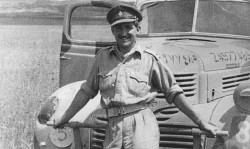
How to Kill
Under the parabola of a ball,
a child turning into a man,
I looked into the air too long.
The ball fell in my hand, it sang
in the closed fist: Open Open
Behold a gift designed to kill.
Now in my dial of glass appears
the soldier who is going to die.
He smiles, and moves about in ways
his mother knows, habits of his.
The wires touch his face: I cry
NOW. Death, like a familiar, hears
and look, has made a man of dust
of a man of flesh. This sorcery
I do. Being damned, I am amused
to see the centre of love diffused
and the wave of love travel into vacancy.
How easy it is to make a ghost.
The weightless mosquito touches
her tiny shadow on the stone,
and with how like, how infinite
a lightness, man and shadow meet.
They fuse. A shadow is a man
when the mosquito death approaches.
Keith Douglas
(1920 – 1944)
How to Kill
• fleursdumal.nl magazine
More in: Archive C-D, Archive C-D, Douglas, Keith, WAR & PEACE

Vergissmeinnicht
(Forget-me-not))
Three weeks gone and the combatants gone
returning over the nightmare ground
we found the place again, and found
the soldier sprawling in the sun.
The frowning barrel of his gun
overshadowing. As we came on
that day, he hit my tank with one
like the entry of a demon.
Look. Here in the gunpit spoil
the dishonoured picture of his girl
who has put: Steffi. Vergissmeinnicht.
in a copybook gothic script.
We see him almost with content,
abased, and seeming to have paid
and mocked at by his own equipment
that’s hard and good when he’s decayed.
But she would weep to see today
how on his skin the swart flies move;
the dust upon the paper eye
and the burst stomach like a cave.
For here the lover and killer are mingled
who had one body and one heart.
And death who had the soldier singled
has done the lover mortal hurt.
Keith Douglas
(1920 – 1944)
Vergissmeinnicht (Forget-me-not)
• fleursdumal.nl magazine
More in: Archive C-D, Archive C-D, Douglas, Keith, WAR & PEACE
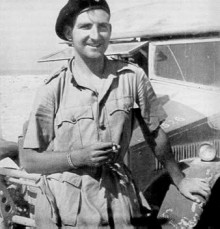
Simplify Me When I’m Dead
Remember me when I am dead
and simplify me when I’m dead.
As the processes of earth
strip off the colour of the skin:
take the brown hair and blue eye
and leave me simpler than at birth,
when hairless I came howling in
as the moon entered the cold sky.
Of my skeleton perhaps,
so stripped, a learned man will say
“He was of such a type and intelligence,” no more.
Thus when in a year collapse
particular memories, you may
deduce, from the long pain I bore
the opinions I held, who was my foe
and what I left, even my appearance
but incidents will be no guide.
Time’s wrong-way telescope will show
a minute man ten years hence
and by distance simplified.
Through that lens see if I seem
substance or nothing: of the world
deserving mention or charitable oblivion,
not by momentary spleen
or love into decision hurled,
leisurely arrive at an opinion.
Remember me when I am dead
and simplify me when I’m dead.
Keith Douglas
(1920 – 1944)
Simplify Me When I’m Dead
• fleursdumal.nl magazine
More in: Archive C-D, Archive C-D, Douglas, Keith, WAR & PEACE

The Knife
Can I explain this to you? Your eyes
are entrances the mouths of caves
I issue from wonderful interiors
upon a blessed sea and a fine day,
from inside these caves I look and dream.
Your hair explicable as a waterfall
in some black liquid cooled by legend
fell across my thought in a moment
became a garment I am naked without
lines drawn across through morning and evening.
And in your body each minute I died
moving your thigh could disinter me
from a grave in a distant city:
your breasts deserted by cloth, clothed in twilight
filled me with tears, sweet cups of flesh.
Yes, to touch two fingers made us worlds
stars, waters, promontories, chaos
swooning in elements without form or time
come down through long seas among sea marvels
embracing like survivors in our islands.
This I think happened to us together
though now no shadow of it flickers in your hands
your eyes look down on ordinary streets
If I talk to you I might be a bird
with a message, a dead man, a photograph.
Keith Douglas
(1920 – 1944)
The Knife
• fleursdumal.nl magazine
More in: Archive C-D, Archive C-D, Douglas, Keith, WAR & PEACE

Oxford
At home as in no other city, here
summer holds her breath in a dark street
the trees nocturnally scented, lovers like moths
go by silently on the footpaths
and spirits of the young wait,
cannot be expelled, multiply each year.
In the meadows, walks, over the walls
the sunlight, far-travelled, tired and content,
warms the recollections of old men, touching
the hand of the scholar on his book, marching
through quadrangles and arches, at last spent
it leans through the stained windows and falls.
This then is the city of young men, of beginning,
ideas, trials, pardonable follies,
the lightness, seriousness and sorrow of youth.
And the city of the old, looking for truth,
browsing for years, the mind’s seven bellies
filled, become legendary figures, seeming
stones of the city, her venerable towers;
dignified, clothed by erudition and time.
For them it is not a city but an existence;
outside which everything is a pretence:
within, the leisurely immortals dream,
venerated and spared by the ominous hours.
Keith Douglas
(1920 – 1944)
Oxford
• fleursdumal.nl magazine
More in: # Classic Poetry Archive, Archive C-D, Archive C-D, Douglas, Keith, WAR & PEACE

Desert Flowers
Living in a wide landscape are the flowers –
Rosenberg I only repeat what you were saying –
the shell and the hawk every hour
are slaying men and jerboas, slaying
the mind: but the body can fill
the hungry flowers and the dogs who cry words
at nights, the most hostile things of all.
But that is not new. Each time the night discards
draperies on the eyes and leaves the mind awake
I look each side of the door of sleep
for the little coin it will take
to buy the secret I shall not keep.
I see men as trees suffering
or confound the detail and the horizon.
Lay the coin on my tongue and I will sing
of what the others never set eyes on.
Keith Douglas
(1920 – 1944)
Desert Flowers
• fleursdumal.nl magazine
More in: Archive C-D, Archive C-D, Douglas, Keith, WAR & PEACE
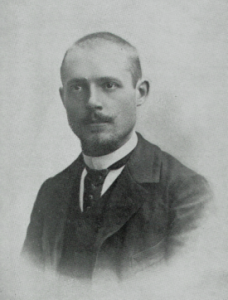
Paris double galère
Depuis le Point-du-Jour jusqu’aux cèdres bibliques
Double galère assise au long du grand bazar,
Et du grand ministère, et du morne alcazar,
Parmi les deuils privés et les vertus publiques ;
Sous les quatre-vingts rois et les trois Républiques,
Et sous Napoléon, Alexandre et César,
Nos pères ont tenté le centuple hasard,
Fidèlement courbés sur tes rames obliques.
Et nous prenant leur place au même banc de chêne,
Nous ramerons des reins, de la nuque, de l’âme,
Pliés, cassés, meurtris, saignants sous notre chaîne ;
Et nous tiendrons le coup, rivés sur notre rame,
Forçats fils de forçats aux deux rives de Seine,
Galériens couchés aux pieds de Notre Dame.
Charles Péguy
(1873 – 1914)
Paris double galère
1913
• fleursdumal.nl magazine
More in: # Classic Poetry Archive, Archive O-P, Archive O-P, FDM in Paris, Peguy, Charles, WAR & PEACE

Quatrains
Cœur dur comme une tour,
Ô cœur de pierre,
Donjon de jour en jour
Vêtu de lierre.
De tous liens lié
A cette terre,
Ô cœur humilié,
Cœur solitaire.
Cœur qui as tant crevé
De pleurs secrets,
Buveur inabreuvé,
Cendre et regrets.
Cœur tant de fois baigné
Dans la lumière,
Et tant de fois noyé
Source première.
Ô cœur laissé pour mort
Dans le fossé,
Cœur tu battais encore,
Ô trépassé.
Ô cœur inexploré,
Vaste univers,
Idole décorée,
Jardin d’hiver.
Ô vase de regret
Plein jusqu’aux bords
Du venin d’un remords
Inespéré…
Ô vieil arbre écorcé,
Rongé des vers,
Vieux sanglier forcé,
Ô cœur pervers…
Cœur qui as tant saigné
D’amour, de haine,
Ô cœur mal résigné
De tant de peine.
Cœur tant de fois flétri
Au dur labeur,
Cœur tant de fois fleuri
Aux soirs de mai…
Cœur tant de fois forgé
Sous le marteau,
Cœur tant de fois crevé
Sous le couteau…
Cœur qui a tant rêvé,
Ô cœur charnel,
Ô cœur inachevé
Cœur éternel.
Cœur qui a tant battu,
D’amour, d’espoir,
Ô cœur trouveras-tu
La paix du soir…
Cœur tant de fois pétri,
Ô pain du jour,
Cœur tant de fois meurtri,
Levain d’amour.
Cœur qui a tant battu,
D’amour, de haine,
Cœur tu ne battras plus
De tant de peine.
Cœur dévoré d’amour,
Te tairas-tu,
Ô cœur de jour en jour
Inentendu…
Cœur plein d’un seul regret
Poignant et bref,
Comme un unique fret
Charge une nef.
Cœur plein d’un seul regret
Poignant et sourd,
Comme un fardeau trop lourd
Charge une nef.
Cœur vaisseau démarré
A charge pleine,
Vaisseau désemparé
De sa misaine.
Cœur plein d’un seul amour,
Désaccordé,
Ô cœur de jour en jour
Plus hasardé…
Dans ce noble séjour,
Cœur attardé,
Plein d’un secret si lourd,
Mur lézardé…
Ô cœur exténué,
Péri d’amour,
Ô cœur de jour en jour
Destitué…
Ô peine aux longs cheveux
Couchée au lit
De l’homme que tu veux
Enseveli.
Ô peine aux longs cheveux
Couchée au long
De l’homme juste et bon
Au même lit.
Enseveli sois-tu
Dans cet amour
Et dans cette vertu
Et cette tour.
Loué sois-tu, cœur frêle,
Pour ta rudesse,
Loué sois-tu, cœur grêle,
Pour ta tristesse.
Pour tes renoncements,
Ô dépouillé,
Pour tes abaissements,
Ô cœur souillé.
Cœur tant de fois cloué
Au dur gibet,
Tant de fois bafoué
De quolibets.
Et pardonné sois-tu,
Notre cœur, vil,
Au nom des Trois Vertus,
Ainsi soit-il.
Tu avais tout pourvu,
Ô confident,
Tu avais tout prévu,
Ô provident.
Tu avais tout pourvu,
Fors d’une fièvre,
Tu avais tout prévu,
Fors que deux lèvres…
Tu avais tout pourvu,
Fors une flamme,
Tu avais tout prévu,
Fors une autre âme.
Tu avais fait ton compte,
Ô prévoyant,
Tu n’avais oublié
Qu’un cœur battant…
Charles Péguy
(1873 – 1914)
Quatrains
• fleursdumal.nl magazine
More in: # Classic Poetry Archive, Archive O-P, Archive O-P, Peguy, Charles, WAR & PEACE
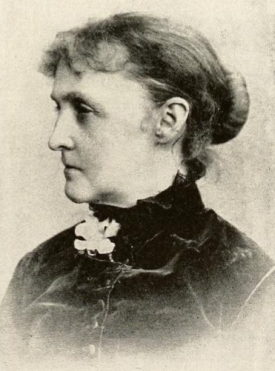
Hearing the Battle
July 21, 1861
One day in the dreamy summer,
On the Sabbath hills, from afar
We heard the solemn echoes
Of the first fierce words of war.
Ah, tell me, thou veilèd Watcher
Of the storm and the calm to come,
How long by the sun or shadow
Till these noises again are dumb.
And soon in a hush and glimmer
We thought of the dark, strange fight,
Whose close in a ghastly quiet
Lay dim in the beautiful night.
Then we talk’d of coldness and pallor,
And of things with blinded eyes
That stared at the golden stillness
Of the moon in those lighted skies;
And of souls, at morning wrestling
In the dust with passion and moan,
So far away at evening
In the silence of worlds unknown.
But a delicate wind beside us
Was rustling the dusky hours,
As it gather’d the dewy odors
Of the snowy jessamine-flowers.
And I gave you a spray of the blossoms,
And said: “I shall never know
How the hearts in the land are breaking,
My dearest, unless you go.”
Sarah Morgan Bryan Piatt
(1836–1919)
Hearing the Battle.
(July 21, 1861)
Poem
• fleursdumal.nl magazine
More in: # Classic Poetry Archive, #Editors Choice Archiv, *War Poetry Archive, Archive O-P, Archive O-P, WAR & PEACE

Paradis est plus fleuri que printemps.
Paradis est plus moissonneux qu’été.
Paradis est plus vendangeux qu’automne.
Paradis est si éternel qu’hiver.
Paradis est plus soleilleux que jour.
Paradis est plus étoilé que nuit.
Paradis est plus ferme que le ferme décembre.
Paradis est plus doux que le doux mois de mai.
Paradis est plus secret que jardin fermé.
Paradis est plus ouvert que champ de bataille.
Paradis est plus vieux que saint Jérôme.
Paradis est le céleste pourpris.
Paradis est plus capital que Rome.
Paradis est plus peuplé que Paris.
Paradis est désert plus que plaine en décembre.
Paradis est public et qui veut vient y boire.
Paradis est plus frais que l’aube fraîche.
Paradis est plus ardent que midi.
Paradis est plus calme que le soir.
Paradis est si éternel que Dieu.
Paradis est sanglant plus que champ de bataille.
Paradis est sanglant du sang de Jésus-Christ.
Paradis est royaume des royaumes.
Paradis est le dernier reposoir.
Paradis est le siège de Justice.
Paradis est le royaume de Gloire.
Paradis est plus beau qu’un jardin de pommiers.
Paradis est plus floconneux qu’hiver.
Paradis est plus sévère que mars.
Paradis est plus boutonneux qu’avril.
Paradis est plus bourgeonneux qu’avril.
Paradis est plus cotonneux qu’avril.
Paradis est plus embaumé que mai.
Paradis est plus accueillant qu’auberge.
Paradis est plus fermé que prison.
Paradis est demeure de la Vierge.
Paradis est la dernière maison.
Paradis est le Trône de Justice.
Veuille seulement Dieu que route y aboutisse.
Route que cheminons depuis dix-huit cents ans.
Paradis est auberge à la très belle enseigne.
Car c’est l’enseigne-ci : à la Croix de Jésus.
Cette enseigne éternelle est pendue à la porte.
Charles Péguy
(1873 - 1914)
Le Mystère des Saints-Innocents
(1912)
• fleursdumal.nl magazine
More in: # Classic Poetry Archive, Archive O-P, Archive O-P, Peguy, Charles, WAR & PEACE
Neuf récits composent La frontière des oubliés et retracent le parcours de l’écrivaine, depuis sa fuite, enfant, de la frontière afghane pour se bâtir une vie à Téhéran.
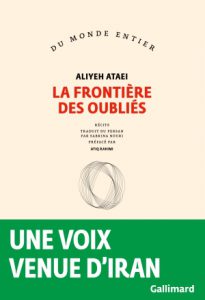 Dans chacune de ces vignettes de vie qui se font écho, elle brosse le portrait de ses compatriotes exilés, des « frontaliers », souvent des femmes, qui portent tous des traces de la guerre, des plaies profondes marquées par des balles invisibles.
Dans chacune de ces vignettes de vie qui se font écho, elle brosse le portrait de ses compatriotes exilés, des « frontaliers », souvent des femmes, qui portent tous des traces de la guerre, des plaies profondes marquées par des balles invisibles.
À chaque rencontre, elle s’interroge sur la violence, l’exil et l’identité. Et en s’imprégnant de son propre vécu, Aliyeh Ataei embrasse ici plus largement le sort de tous ceux qui ont hérité des « chromosomes-douleurs », se faisant l’écho de leurs voix si peu audibles.
La frontière des oubliés nous fait découvrir une nouvelle plume puissante venue d’Iran. De son style clair et tranchant, Aliyeh Ataei dévoile des vérités qui secouent, et bouleversent.
Aliyeh Ataei
La frontière des oubliés
[Koorsorkhi]
Trad. du persan par Sabrina Nouri. Préface d’Atiq Rahimi
Collection Du monde entier, Gallimard
Parution : 13-04-2023
160 pages
140 x 205 mm
Achevé d’imprimer: 01-03-2023
ISBN: 9782073006745
Gencode: 9782073006745
Code distributeur: G07173
Livre imprimé € 18,00
• fleursdumal.nl magazine
More in: - Book News, - Bookstores, Archive A-B, REPRESSION OF WRITERS, JOURNALISTS & ARTISTS, WAR & PEACE
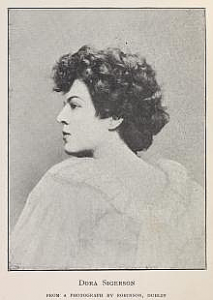
The Dead Soldier
(In memory of Thomas Ashe)
Where the sword has opened the way the man will follow
“Look! they came, the triumphant army!
Over yon hill see their weapons peeping!”
Still I spoke not but my wheel sent turning,
I closed my eyes for my heart was weeping,
My heart was weeping for a dead soldier.
Who is he who looks towards me ?
“’Tis no man but a gay flag flying,”
Red was his mouth and his white brow thoughtful,
Blue his eyes — how my soul is crying,
My soul is crying for a dead soldier.
“Kneel ye down, lest your eyes should dare them,
Kneel ye down and your beads be saying.”
“Lord, on their heads Thy wrath deliver,”
This is the prayer that my lips are praying,
My heart is praying for a dead soldier.
“Best cheer the path of the men victorious,
For he is dead and his blade lies broken,
His march is far where no aid can follow,
And for his people he left no token,
He left no token, the dead soldier.”
The way of the sword a man can follow,
See the young child with his gold hair gleaming.
When falls the oak must the acorn perish?
He lifts the blade and his eyes are dreaming,
He dreams the dream of the dead soldier.
THE END
Dora Maria Sigerson Shorter
(1866 – 1918)
The Dead Soldier
(In memory of Thomas Ashe)
• fleursdumal.nl magazine
More in: Archive S-T, Archive S-T, Sigerson Shorter, Dora Maria, WAR & PEACE
Thank you for reading Fleurs du Mal - magazine for art & literature